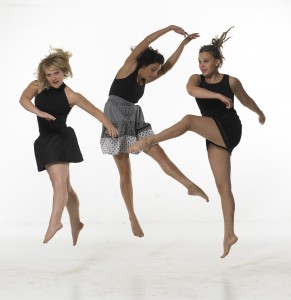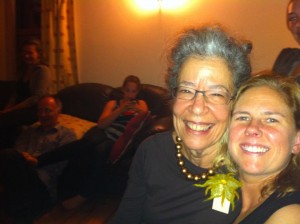
Dancers Alaina Murray, Madelyn Doyle & Maggie Koller of The Dance COLEctive. Photo by William Frederking.
Next weekend at The Ruth Page Center for the Arts, The Dance COLEctive (TDC) takes the stage with Built By Fault, a concert featuring two works by Artistic Director Margi Cole and a solo, I Think Not, for Cole choreographed by Deborah Hay, a former Cunningham dancer and choreographer noted for her work in the solo form. Last season’s Pull Taught (previewed here), inspired by Malcolm Gladwell’s book Blink, tackles instincts, gut reactions and how we come to quick decisions. Cole’s new work for ten dancers, Moving Stories, reflects on the definition of home, a topic weighing on her mind while traveling in Europe for two weeks last August. “You have your tiny creature comforts that you take with you – my water bottle, my ball I wanted to roll on, a scarf I wore every day – it really makes you think about what you’re returning to, what you need and how home is defined,” she tells me over breakfast in Lakeview. “Is it defined by the place where you are? Is it defined by the stuff you have with you? Is it defined by people? Is it always in the same place or does it change?” Using these questions as a jumping-off point, the exploration quickly turned to questions about moving from one place to the next and how you decide what is important enough to keep. That conversation naturally transitioned to moments of being emotionally moved. Cole had just returned from Hay’s The Solo Performance Commissioning Project in Findhorn, Scotland, an experience she calls profound and humbling.
I want to talk about your solo. Why did you want to work with Deborah Hay?
My interest was really about her solo practice and how it aligned with my interest in solo dance making and the fact that I’m scared shitless to make my own solo. I’m still not ready to do that, so it’s a little stepping stone to that place where I might jump off and make myself a solo…sometime. It’s hard to be in the work. It’s hard to be inside of it. Regardless of whether I’m the dance maker or the performer, the solo is informed by my experience. I’m imprinted in it. I have a little cache of solos that I’ve been doing since TDC started. I think it’s important for me, as the primary spokesmodel to have a presence that way…and important for me to have the opportunity to learn and flip the tables so that I’m the dancer instead of the choreographer. Then I have more to give back to the dancers. Local dancers Julia Mayer and Emily Stein had worked with Deborah and said they had really profound experiences.
Did you have to audition? How did you get chosen to attend the workshop?
You have to apply and get accepted and then you have to fulfill the caveat that you have to raise the money from the community. You couldn’t throw any of your own money into the pot. I had to meet the deadline for the commissioning fee by December, so I went to the Driehaus Foundation and said “this is something I really want to do, would you be willing to help me? I’m going to raise the rest of the money through a Kickstarter program” and they were willing to help, then I raised the rest of the money through Kickstarter. It’s a great mechanism. I love that it has a deadline.
What was the was the solo process like?
It’s almost like you have to strip down…you have to take away everything you know in order for you to get to a place where you can really have some self-reflection and have an authentic experience. It’s really fucking scary. The way she works allows for you to have this really profound experience. She’s been working on solo practice for 40 years. She’s got it perfected to some degree. It’s perfected in a way that the shape of the process holds. It’s like this vessel that allows you to explore and discover something new all the time. That’s really part of what all of this was about. I had a lot of epiphanies there. One of the things that happened for me was that I recognized that the practice was all about honoring time in a different way. It’s not about how much less you have, but how much more you have and that having a vast space for experience to happen is valid. Having less time is part of my culture and using the time that I need and actually using the time that I need has the potential to be a political statement for me. I also realized that I make myself terminally busy, so that I don’t have to self-reflect. I had this moment with Deborah one day where she came and talked to me in group practice…there’s 20 of us in the room and she could tell that I was struggling and having this moment and she said, “I can see that there’s a lot bubbling up for you and you’re getting a lot out of the process. You know what’s really beautiful about it is what you’re getting is coming to you from the dance…through the experience of the dance.” I’ve been dancing all this time and, in essence, just giving, giving and giving and never asking it for anything back. The fact that I was having this really profound experience and it was being given to me by dancing was really overwhelming. She just has this amazing power. I felt really vulnerable the whole time I was working. Deborah is so dedicated to discovering something new every time. That’s not easy to do. You have to be fully present and open.
So, will all 20 of you do the same solo?
What happens is she gives us a score. Basically it walks you through the whole process step-by-step. It tells you where to go in terms of your shape, the choreography…and everybody has the same score. Then she teaches you how she operates in space and what her values are around having that particular experience. That’s how you surf in the structure of the score. She gives us permission to create an adaptation* of her work. An adaptation implies the evolution of the solo, so we can add a costume, we can add text, film, lights, etc. We can’t create another element to the structure, but you can subtract from it. When she sends you away, you sign a contract that says you have to practice your solo daily for three months, basically five days a week, and you have to commit to the exploration of the solo practice. That paired with your commitment to the community of people who have backed your work gives you accountability. We can invite people to come and watch. It’s a challenge to incorporate the daily practice into your life on top of everything else. I’ve been doing it, but it hasn’t been easy. Again one of the big things I got from this was about honoring time. As I’ve been doing my practice, I’ve had a really hard time getting over the hump toward a longer version of the solo. Ideally, it’s around 22 mins. That’s a challenge for me, but it was also a discovery of how I operate personally. I have self-discipline when it comes to getting the job done when it needs to be done, but when it has to do with me, then it’s not so good. I’m really good at making myself the last priority. I did the solo on Sunday and one of the things that one of my dancers said was that she’d never seen me do anything like this before. That was a huge compliment. If I feel uncomfortable, then I rely on Margi-the-dancer and now I’m more to a point where I don’t have to rely on Margi-the-dancer to hold my own in the material. I feel braver about being able to go beyond her.
Are you freaking out about having to perform it next week?
I’m a little scared. I get nervous when I perform. I have so many people invested in me and this that I want it to come off. But I’m also so enamored with Deborah that how the adaptation comes to life is really important. I want to honor her process and vision in terms of the work.
I think it’s crazy brave. I would never have the balls to do it.
I knew what I was getting myself into, but…didn’t realize what I was going to take away from it. She kept saying, “What if where I am is what I need?” What do I need? I never give myself enough time to think about it.
*Hay’s notes on adaptation here.
The Dance COLEctive presents ‘Built By Fault’, Jan 26 – 28 @ 8pm
Ruth Page Center, 1016 N Dearborn, Tickets $25 (Students/Seniors $20)


What an interesting interview! I hope the performance goes well.